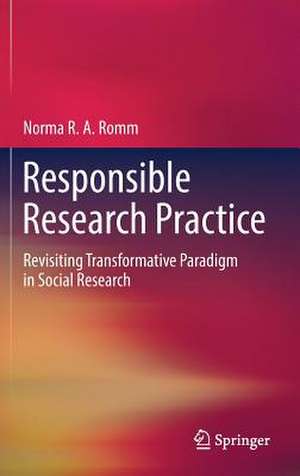Responsible Research Practice: Revisiting Transformative Paradigm in Social Research
Autor Norma RA Rommen Limba Engleză Hardback – 4 mai 2018
| Toate formatele și edițiile | Preț | Express |
|---|---|---|
| Paperback (1) | 886.66 lei 6-8 săpt. | |
| Springer International Publishing – 12 ian 2019 | 886.66 lei 6-8 săpt. | |
| Hardback (1) | 892.88 lei 6-8 săpt. | |
| Springer International Publishing – 4 mai 2018 | 892.88 lei 6-8 săpt. |
Preț: 892.88 lei
Preț vechi: 1088.88 lei
-18% Nou
Puncte Express: 1339
Preț estimativ în valută:
170.96€ • 178.02$ • 141.84£
170.96€ • 178.02$ • 141.84£
Carte tipărită la comandă
Livrare economică 12-26 februarie
Preluare comenzi: 021 569.72.76
Specificații
ISBN-13: 9783319743844
ISBN-10: 3319743848
Pagini: 404
Ilustrații: XXVII, 518 p. 3 illus.
Dimensiuni: 155 x 235 x 38 mm
Greutate: 0.94 kg
Ediția:1st ed. 2018
Editura: Springer International Publishing
Colecția Springer
Locul publicării:Cham, Switzerland
ISBN-10: 3319743848
Pagini: 404
Ilustrații: XXVII, 518 p. 3 illus.
Dimensiuni: 155 x 235 x 38 mm
Greutate: 0.94 kg
Ediția:1st ed. 2018
Editura: Springer International Publishing
Colecția Springer
Locul publicării:Cham, Switzerland
Cuprins
Chapter 1. Introduction: Activating Transformative Intent in Consideration of the Immersion of Research in Social and Ecological Existence.- Chapter 2. Active Focus Group Research with Follow-up Interviews/ Conversations and Actions: Responsibility Re-exploring Race(d) and Classed Relations.- Chapter 3. Active Use of Questionnaires Combined with Focus Group Facilitation: Responsibly Researching Options for Generating Educational Inclusivity .- Chapter 4. Actively Facilitating Individual and Focus Group Narrations: Responsibly Foregrounding Gender Stereotyping While Stimulating (Contextual) Empowerment.- Chapter 5. Active Use of Experiments: Responsibly Inviting Participants and Others to Review Options for Agency.- Chapter 6. Development-oriented Research to Forward Social and Environmental Justice: Responsibly Strengthening Discourses and Actions Toward an Inclusive Wellbeing.- Chapter 7. Responsible Generating Theorizing.- Chapter 8. Practicing Ethical Responsibility: Reconfiguring the Belmont Model.- Chapter 9. Practicing Multiple and Mixed Methods Research Responsibly: Some Paradigmatic Considerations.- Chapter 10. Conclusion to the Book: Storying our Co-responsibilities as Part of Methodological Write-up.
Recenzii
“This is a crucial text for scholars of race, gender and class relations, as well as those interested, academically or generally, in contributing to transforming social rifts by re-examining their methodological practices. If researchers are to see responsible research rolled out within academic institutions and activist circles, then this should serve as excellence guidance among methodological books in social science.” (Vassilissa Carangio, Ethnic and Racial Studies, October 14, 2020)
“I celebrate ROMM’s scholarship; I thank her and all those who contributed to the thesis for assembling a reaffirmation of the envisioned, flourishing world that the early action researchers fought for. Its re-arrival is timely and heralds a new generation who are reconfiguring inherited knowledge-craft in the context of the twenty-first century.” (Susan Goff, Systemic Practice and Action Research, July02, 2019)
“I celebrate ROMM’s scholarship; I thank her and all those who contributed to the thesis for assembling a reaffirmation of the envisioned, flourishing world that the early action researchers fought for. Its re-arrival is timely and heralds a new generation who are reconfiguring inherited knowledge-craft in the context of the twenty-first century.” (Susan Goff, Systemic Practice and Action Research, July02, 2019)
Notă biografică
Norma Romm (D Litt et Phil, Sociology) is currently a research professor in the Department of Adult Education and Youth Development at the University of South Africa. She is the author of The Methodologies of Positivism and Marxism (1991), Accountability in Social Research (2001), New Racism (2010), People’s Education in Theoretical Perspective (with V. I. McKay, 1992), Diversity Management (with R. L. Flood, 1996), and Assessment of the Impact of HIV and AIDS in the Informal Economy of Zambia (with V. I. McKay, 2008). She has co-edited three books—Social Theory (with M. Sarakinsky, 1994), Critical Systems Thinking (with R. L. Flood, 1996), and Balancing Individualism and Collectivism (with J. J. McIntyre-Mills and Y. Corcoran-Nantes, 2017). She has published more than 100 research articles on the contribution of research to social development; the way in which research can be practiced accountably; Indigenous ways of knowing and living; transformative-directed research; community-engaged research; and the facilitation of adult learning. She has worked on a range of projects aimed at increasing equity for organizations such as the ILO, ADEA, and IOM.
Textul de pe ultima copertă
This book explores ways in which creative research practice can be explicitly and mindfully geared to make a difference to the quality of social and ecological existence. It offers a range of examples of how different research methods can be employed (and re-tuned) with this intention. The book suggests that what Romm names "active" research involves using the research space responsibly to open up new avenues for thinking and acting on the part of those involved in the inquiry and wider stakeholders. The book includes a discussion of a range of epistemological, ontological, methodological and axiological positions (or paradigms) that can be embraced by inquirers implicitly or explicitly. It details the contours of an epistemology where knowing is recognized to be grounded in social relations, as a matter of ethics. While focusing on discussing the “transformative paradigm” and attendant view of research ethics, it considers to what extent the borders between paradigms can be treated as being permeable in creative and active inquiries. Apart from considering options for enhancing responsible research practice during the process of inquiry (and reconsidering mixed-research designs) the book also considers options for responsible theorizing that is inspirational for pursuing goals of social and ecological justice.
Caracteristici
Explores how creative research practice can be directed to make a difference to the quality of social and ecological existence Presents a synthesis of different strands and arguments for responsible and accountable social inquiry Revisits transformative paradigm for social research
